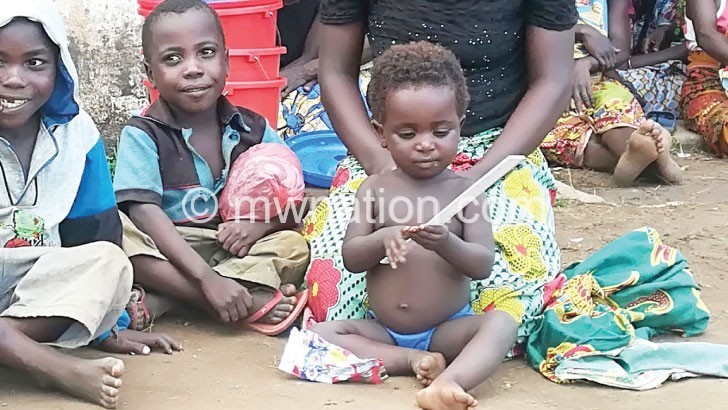Children in congested camps
Tiyamikane Makhuludzo was forced to flee to Chikunkha Primary School in Nsanje South when floods shattered his home to rubble last month. The boy and his parents and two siblings are among over 1 000 flood survivors occupying the abandoned school in Traditional Authority (T/A) Malemia.
His mother, Sophia Lokomani, says it was not easy for the three children to accept the swift change in living conditions when they moved into the congested camp where ventilation, privacy and sanitation are compromised.

“From sleeping comfortably in their rooms to sharing a crammed classroom with many people, it took them days to come to terms with it,” she says.
The family is among 869 000 Malawians affected by last month’s floods which displaced almost 86 000 people in 15 districts. The homeless survivors took refuge in 173 camps across the southern half of the country.
Since they moved into the dilapidated school, Tiyamikane and 207 other children have been sleeping on dirty floors, with only zitenje (wrappers) to keep them warm.
“I have three wrappers: I spread one on the floor where my two-year-old Marita sleeps. I use another to cover myself and the baby. Tiyamikane and his brother use the third one at night,” she says.
For the children, life is a nightmare. Lack of proper beddings exposes their bodies to mosquito bites, increasing the risk of malaria infections which are common in the overcrowded camps. Congestion makes it tough for the woman to erect an insecticide treated mosquito net to keep out mosquitoes.
As the mosquitoes buzz in the night, the children sleep rough, sniffing the dust from the dirty floor. This makes them vulnerable to coughs. Tiyamikane has caught the cold three times since he checked in.
But the challenges during the day are equally distressing to young people.
“The children do not have adequate meals. Relief food comes sporadically. Many go without proper meals for days. The well off can afford a single decent meal a day,” says Enifa Jombo, a mother of four.
This community confined to the camp, where they wait all day for trucks bringing relief items, raid neighbouring crop fields in search of vegetables, pumpkins, cucumbers to ensure children do not starve.
Inconsistent food supply and poor diet leave children at risk of malnutrition.
“We go out in clusters to do whatever piece works come handy to get food for our children,” says Jombo.
For school-going children, the disaster has disrupted learning. After losing uniforms, books, pens and other basic learning materials in the disaster, the pupils have to walk longer to get to school.
Tiyamikane is in Standard One at New Chikunkha Primary School near her home. Now he has to travel some seven kilometres to get there.
His mother says this has made him lose interest in school. After all, the children at the camp go to school hungry and often find no food when they return.
At Mguda Camp in T/A Tengani, Nsanje Central, young people say uncomfortable conditions are affecting their school performance.
Elena Joseph, a Form Two student at Mpasa Community Day Secondary School, says she no longer concentrates in class during lessons.
“Due to congestion in the tents, we have to contend with the noise and endless footsteps of people coming in and going out. There is no time to study. Shortage of food makes matters worse. You cannot concentrate on studying with an empty stomach,” she says.
There are about 1 500 people at Chikunkha-Mbango Camp and 220 are children.
“Our primary interest is to protect the children from falling sick owing to poor sanitation and acts of violence from older people. I underwent training on child protection and their rights. I use these skills to protect the children,” says camp chairperson Yohane Edward.
The internally displaced community is at risk of preventable infections due to poor sanitation and limited access to water.
Sanitation gap
In most camps, people are forced to defaecate in the open in nearby bushes due to shortage of latrines. The overwhelmed latrines in daytime schools also double as bathrooms.
At Tizora Camp in T/A Lundu Chikwawa, 1 628 households live without toilets.
The disaster affairs secretary Victor Tembo decried the situation as a recipe for the outbreak of waterborne diseases, especially for children.
“Sanitation and hygiene should be a priority. In situations like these, children always get affected easily,” he says.
Group village head Chikuse fears that congestion may result in disease outbreaks, including cholera which affected nearly 1 000 people and killed 33 last year.
The camp chairperson, Steven Nyamula, says the breakdown in sanitation is a time bomb.
“That is why we are asking for toilets to be put up at this camp,” he says.
However, some organisations, including Unicef and World Vision, are providing potable toilets in some camps.
Protecting children
According to a report by United Nations Children’s Fund (Unicef), over half of the population affected by the floods are children below 18. The UN agency is targeting about 219 195 children with humanitarian assistance.
Speaking when she visited Tizira Camp, World Vision country director Hazel Nyathi said her organisation was committed to ensure every child affected by the disaster is protected.
“Our priority is the children’s welfare. We want to see them live without their rights being violated,” she said.





